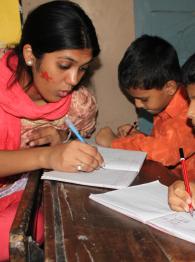
About the Project
This project is one of the 2012 WISE Awards finalists.
Teach For India (TFI) recruits the highest-quality university graduates and young professionals, who drive student achievement and become lifelong leaders able to effect systemic change. TFI then provides participants with rigorous training and professional development. Training begins with an intensive five-week residential course, led by international experts, and continues with weekly training sessions and support from mentor teachers, throughout the two years. The Fellows are then placed for two years in full-time teaching positions, with clear accountability for their classrooms, in areas with educational inequality where impact on student achievement will be maximized. An extensive rubric is used to determine which schools are chosen, with emphasis on the need within those schools, and their willingness to partner. Finally, it provides support that streamlines and clarifies paths to leadership, in order to eliminate educational inequality. This includes arranging summer internships between the first and second years of the Fellowship, hosting an “Action Curriculum” where Fellows can prepare themselves for different career paths, and a job-placement cell.
Context and Issue
The project is addressing the issues relating to the lack of resources in municipal schools and low-income private schools; poor quality of teachers; huge economic disparity which leads to educational inequity and over-large class sizes. India is facing an educational crisis that is twofold. Firstly, many students are not making it through the system. According to a recent World Bank study, in 2007 alone India had over seven million out-of-school children, and it is estimated that more than one in three children who begin primary school will drop out before reaching the fifth grade. Secondly, the students that are in the system are receiving a vastly inadequate education. While wealthy Indian children have access to quality education, their low-income peers continue to lag an average of two to three grade levels behind.
Solution and Impact
The core belief at Teach For India is that the root of systemic change is leadership – leadership that understands the problem, knows how to change it, and is committed to doing so. TFI’s mission is to build the movement of leaders who will end educational inequity. It recruits India’s most outstanding college graduates and young professionals and places them as full-time teachers in under-resourced schools for two years.
The TFI Fellowship program is structured around the rigorous curriculum developed by Educational Initiatives, in addition to teaching the CBSE curriculum. Most students have skill levels two to four years behind their current grade level and TFI aims to bridge that gap primarily in Reading Comprehension, Reading Fluency, Math, Grammar and Writing.
In terms of impact, in the 2011-2012 academic year, 38 percent of classrooms achieved 1 to1.5 years’ growth in English; 37 percent of classrooms achieved more than 1.5 years’ growth in English; 55 percent of classrooms achieved 1 to 1.5 years’ growth in Math; and 17 percent of classrooms achieved more than 1.5 years’ growth in Math.
TFI started in 2009 with 80 Fellows in 33 schools and 2,800 students impacted across two cities, Pune and Mumbai. Since then, it has grown exponentially each academic year, by working with more schools, recruiting and placing more Fellows and impacting a huge number of students across India. One method was by taking on more staff. The team size currently stands at 106 people from all over the world working tirelessly towards the cause of eliminating educational inequity.
For the 2013 Fellowship, it received 11,260 applications and selected and matriculated 480, or 4.3 percent, of them – those with the most exceptional track records of leadership and demonstrated commitment to the cause.
Future Developments
Teach For India plans to expand to Ahmedabad, Gujarat and will add 500 new Fellows, bringing the cohort size to over 900 Fellows. The project’s objective is to be in 8 to 10 cities in the next 5 years with 2,000 Fellows impacting 60,000 children.


